EUR Markets Await CPI Data Amid Upcoming Rate Hike Decisions Rate Hike Decisions Rate Hike Decisions Rate Hike Decisions
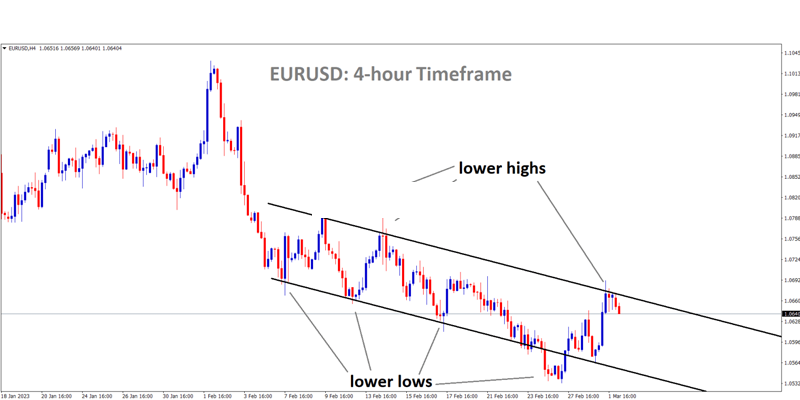
EURUSD is moving in the Descending channel and the market has fallen from the lower high area of the channel.
The EUR markets are anticipating the upcoming CPI data which should be released on Thursday. We are expecting the numbers to come out lower than expected in anticipation of the upcoming interest rate hikes by the ECB this month. Let’s look into the factors that will impact these numbers:
Spain and French Inflation
As a result of the rise in inflation that occurred in France and Spain during the month of February, the cost of borrowing \ money for European governments climbed. At the same time, concerns about how fast the European Central Bank will cease hiking interest rates also grew. The greater rate of inflation seen in food and service costs led to an annual increase in consumer prices in France of 7.2% in the year leading up to February.
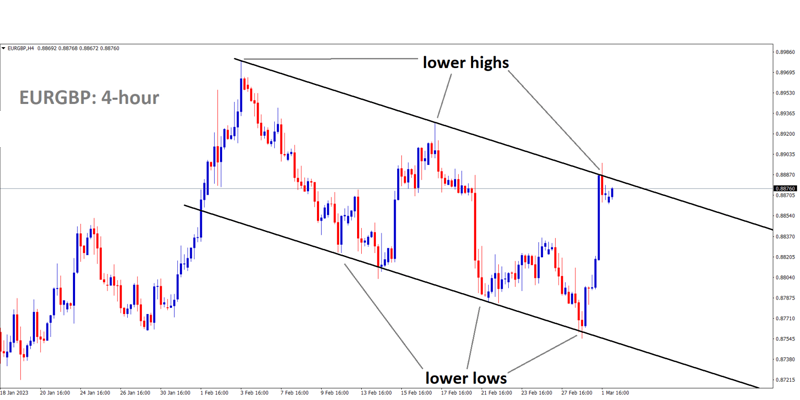
EURGBP is moving in the Descending channel and the market has reached the lower high area of the channel.
This is the highest annual rate seen in France since the introduction of the euro in 1999. Analysts anticipated that the rate of inflation in France would remain unchanged at 7% for the month of January. In spite of the fact that the government reduced food taxes in January, consumer price rise in Spain increased to 6.1% in February, up from 5.9% in January and above economists’ estimates for a decline to 5.5%. This occurred despite the fact that January’s figure was 5.9%.
Even while there’s substantial evidence that monetary policy is kicking in and forward-looking indications suggest price pressures moderating, European Central Bank Chief Economist Philip Lane stated on Tuesday that there was still a strong case for another half percentage point rate increase in March.

The primary factor that contributed to the rise in inflation in France was the accelerated increase in the cost of goods and services, while the cost of energy saw a decrease, despite a 15% increase in the regulated price of power this year. The country’s core inflation rate, which takes into account the cost of processed goods, increased from 5.6% to 5.8% during the last year. The month-over-month increase in French consumer prices quickened to 0.9% in February, compared to a pace of 0.4% in the previous month of January.
Russia-Ukraine War on EU Inflation
The war caused an enormous shock to the economy of the entire world, particularly the markets for energy and food, which resulted in a decrease in supply and an increase in price to unheard-of levels. As compared to other economic regions, the euro area has shown to be particularly susceptible to the adverse effects that Russia’s invasion of Ukraine has had on the global economy. This is mostly due to the fact that the euro area is extremely reliant on energy imports, which were responsible for more than half of the region’s total energy consumption in the year 2020.
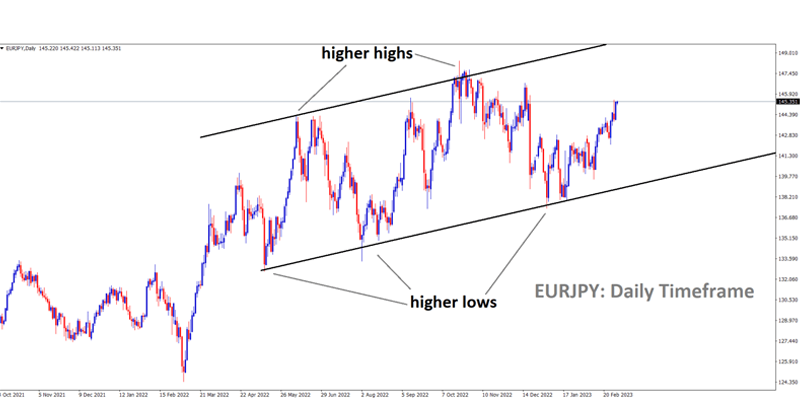
EURJPY is moving in an Ascending channel and the market has rebounded from the higher low area of the channel.
In addition to this, before the conflict, Russia was an essential source of energy for the European Union. Prior to the beginning of Russia’s invasion, Russia and Ukraine both played a significant part in the imports of food and fertilizers into the European Union (EU). In a broader sense, the economy of the euro area is extremely open, which leaves it susceptible to shocks that occur in the value chains and marketplaces that operate on a global scale.

The conflict contributed significantly to the inflationary pressures that were already mounting in the euro area throughout the period of recovery following the pandemic. This led to an increase in consumer prices, particularly for energy and food. The overall rate of inflation jumped from 0.3% in the year 2020 to 2.6% the following year and then to 8.4% the following year. Inflation related to the cost of energy and food contributed more than two-thirds to this record-high level of inflation in 2022.
Eurozone Wages & ECB Reacts
The most recent data from France and Spain hint at ongoing inflationary pressures in the eurozone. These pressures can be seen in both countries. There, pay growth was unexpectedly moderate in 2022. Still, it is anticipated to rise up this year as unions renegotiate multiyear sectoral accords that encompass a significant portion of the workforce in certain nations. The agreement that was reached in November has been referred to by economists as a Goldilocks scenario because it strikes a balance between the risks to growth and inflation. It included wage raises spread out over two years in addition to one-time payments to assist with the increasing cost of utilities. Yet, unions in Germany’s public sector are currently pushing for a salary increase of double digits, while in the Netherlands, unions are coming to an agreement on pay awards of 5 or 6 percent, which is significantly higher than the previous standards.

EURCAD is moving in an Ascending channel and the market has reached the higher low area of the channel.
This week, Christine Lagarde, head of the European Central Bank (ECB), stated that the institution was examining salaries and negotiating pay very closely. Isabel Schnabel, a member of its executive board, has issued a warning that possible wage growth between 4 and 5 percent in the years to come is too high to be consistent with our 2 percent inflation target and may continue for longer in the eurozone than in the United States due to the more widespread use of centralized wage bargaining processes. Yet there is one thing that could keep wage pressures in check in the eurozone. Better employment chances have encouraged more individuals to enter the labor market in the majority of the bloc’s main countries, which has led to economic activity that is higher than it was before the epidemic in France, Germany, and Spain.
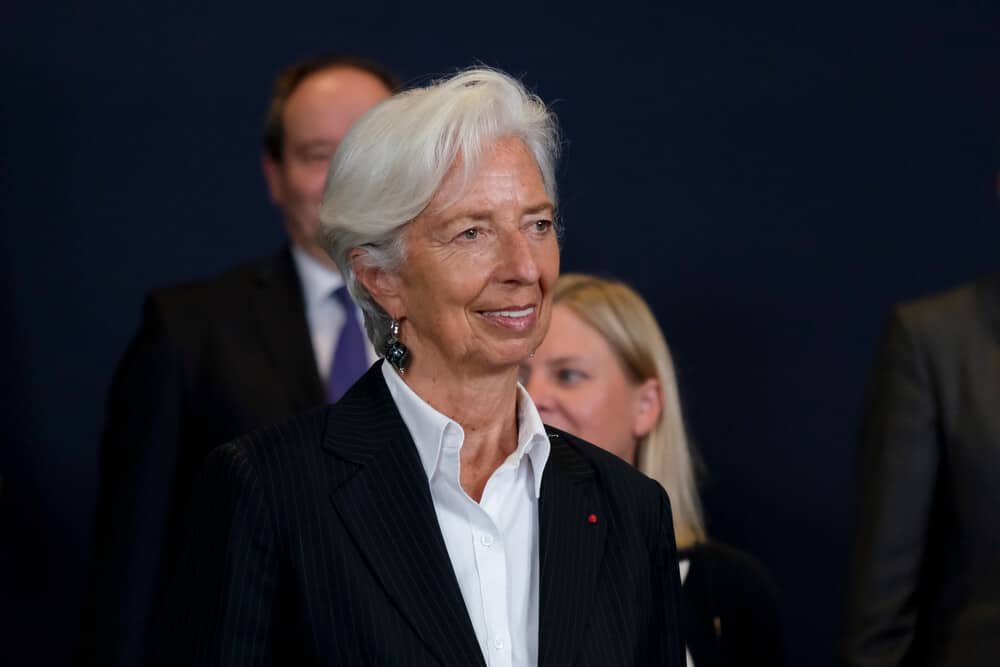
This stands in stark contrast to the situation in the United Kingdom, where the workforce has decreased by more than 300,000 since the outbreak of COVID. The Bank of England sees little prospect of this change in the foreseeable future unless there is an increase in immigration because it has been caused by people who are either too sick to work or who have chosen to leave the workforce. Even if the effects of the pandemic’s legacy begin to lessen with the passage of time, employers will continue to face th limitations imposed by an aging population.
ECB Interest Rates for March
The European Central Bank (ECB) made an announcement in December stating that beginning in March, it will begin to shrink its balance sheet of 5 trillion euros by 15 billion euros per month on average until the end of June 2023. During the course of the previous decade, the central bank for the eurozone used bond purchases to inject billions of euros into the economy of the eurozone in an effort to encourage growth in response to various crises, such as the coronavirus epidemic.
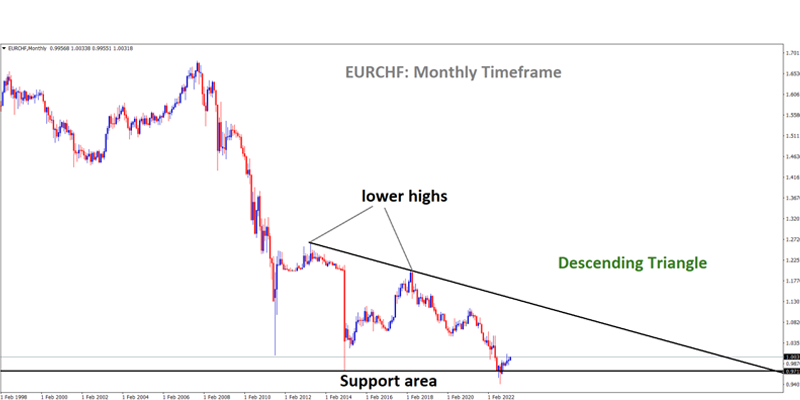
EURCHF is moving in the Descending triangle pattern and the market has rebounded from the horizontal support area of the pattern.
In addition to interest rate increases, the decrease of the central bank’s balance sheet and the liquidation of its bond holdings are viewed as potential additional ways to tighten monetary policy.

On Thursday, it said that it would maintain the approach that it has been following, which is to continue making partial reinvestments of its maturing debt. It is generally agreed that reinvestments in the bond market have a stimulatory effect and have the potential to reduce the pressure on some nations’ average borrowing costs.

EURUSD is moving in the Descending channel and the market has fallen from the lower high area of the channel.
The EUR markets are anticipating the upcoming CPI data which should be released on Thursday. We are expecting the numbers to come out lower than expected in anticipation of the upcoming interest rate hikes by the ECB this month. Let’s look into the factors that will impact these numbers:
Spain and French Inflation
As a result of the rise in inflation that occurred in France and Spain during the month of February, the cost of borrowing \ money for European governments climbed. At the same time, concerns about how fast the European Central Bank will cease hiking interest rates also grew. The greater rate of inflation seen in food and service costs led to an annual increase in consumer prices in France of 7.2% in the year leading up to February.

EURGBP is moving in the Descending channel and the market has reached the lower high area of the channel.
This is the highest annual rate seen in France since the introduction of the euro in 1999. Analysts anticipated that the rate of inflation in France would remain unchanged at 7% for the month of January. In spite of the fact that the government reduced food taxes in January, consumer price rise in Spain increased to 6.1% in February, up from 5.9% in January and above economists’ estimates for a decline to 5.5%. This occurred despite the fact that January’s figure was 5.9%.
Even while there’s substantial evidence that monetary policy is kicking in and forward-looking indications suggest price pressures moderating, European Central Bank Chief Economist Philip Lane stated on Tuesday that there was still a strong case for another half percentage point rate increase in March.

The primary factor that contributed to the rise in inflation in France was the accelerated increase in the cost of goods and services, while the cost of energy saw a decrease, despite a 15% increase in the regulated price of power this year. The country’s core inflation rate, which takes into account the cost of processed goods, increased from 5.6% to 5.8% during the last year. The month-over-month increase in French consumer prices quickened to 0.9% in February, compared to a pace of 0.4% in the previous month of January.
Russia-Ukraine War on EU Inflation
The war caused an enormous shock to the economy of the entire world, particularly the markets for energy and food, which resulted in a decrease in supply and an increase in price to unheard-of levels. As compared to other economic regions, the euro area has shown to be particularly susceptible to the adverse effects that Russia’s invasion of Ukraine has had on the global economy. This is mostly due to the fact that the euro area is extremely reliant on energy imports, which were responsible for more than half of the region’s total energy consumption in the year 2020.

EURJPY is moving in an Ascending channel and the market has rebounded from the higher low area of the channel.
In addition to this, before the conflict, Russia was an essential source of energy for the European Union. Prior to the beginning of Russia’s invasion, Russia and Ukraine both played a significant part in the imports of food and fertilizers into the European Union (EU). In a broader sense, the economy of the euro area is extremely open, which leaves it susceptible to shocks that occur in the value chains and marketplaces that operate on a global scale.

The conflict contributed significantly to the inflationary pressures that were already mounting in the euro area throughout the period of recovery following the pandemic. This led to an increase in consumer prices, particularly for energy and food. The overall rate of inflation jumped from 0.3% in the year 2020 to 2.6% the following year and then to 8.4% the following year. Inflation related to the cost of energy and food contributed more than two-thirds to this record-high level of inflation in 2022.
Eurozone Wages & ECB Reacts
The most recent data from France and Spain hint at ongoing inflationary pressures in the eurozone. These pressures can be seen in both countries. There, pay growth was unexpectedly moderate in 2022. Still, it is anticipated to rise up this year as unions renegotiate multiyear sectoral accords that encompass a significant portion of the workforce in certain nations. The agreement that was reached in November has been referred to by economists as a Goldilocks scenario because it strikes a balance between the risks to growth and inflation. It included wage raises spread out over two years in addition to one-time payments to assist with the increasing cost of utilities. Yet, unions in Germany’s public sector are currently pushing for a salary increase of double digits, while in the Netherlands, unions are coming to an agreement on pay awards of 5 or 6 percent, which is significantly higher than the previous standards.

EURCAD is moving in an Ascending channel and the market has reached the higher low area of the channel.
This week, Christine Lagarde, head of the European Central Bank (ECB), stated that the institution was examining salaries and negotiating pay very closely. Isabel Schnabel, a member of its executive board, has issued a warning that possible wage growth between 4 and 5 percent in the years to come is too high to be consistent with our 2 percent inflation target and may continue for longer in the eurozone than in the United States due to the more widespread use of centralized wage bargaining processes. Yet there is one thing that could keep wage pressures in check in the eurozone. Better employment chances have encouraged more individuals to enter the labor market in the majority of the bloc’s main countries, which has led to economic activity that is higher than it was before the epidemic in France, Germany, and Spain.

This stands in stark contrast to the situation in the United Kingdom, where the workforce has decreased by more than 300,000 since the outbreak of COVID. The Bank of England sees little prospect of this change in the foreseeable future unless there is an increase in immigration because it has been caused by people who are either too sick to work or who have chosen to leave the workforce. Even if the effects of the pandemic’s legacy begin to lessen with the passage of time, employers will continue to face th limitations imposed by an aging population.
ECB Interest Rates for March
The European Central Bank (ECB) made an announcement in December stating that beginning in March, it will begin to shrink its balance sheet of 5 trillion euros by 15 billion euros per month on average until the end of June 2023. During the course of the previous decade, the central bank for the eurozone used bond purchases to inject billions of euros into the economy of the eurozone in an effort to encourage growth in response to various crises, such as the coronavirus epidemic.

EURCHF is moving in the Descending triangle pattern and the market has rebounded from the horizontal support area of the pattern.
In addition to interest rate increases, the decrease of the central bank’s balance sheet and the liquidation of its bond holdings are viewed as potential additional ways to tighten monetary policy.

On Thursday, it said that it would maintain the approach that it has been following, which is to continue making partial reinvestments of its maturing debt. It is generally agreed that reinvestments in the bond market have a stimulatory effect and have the potential to reduce the pressure on some nations’ average borrowing costs.

